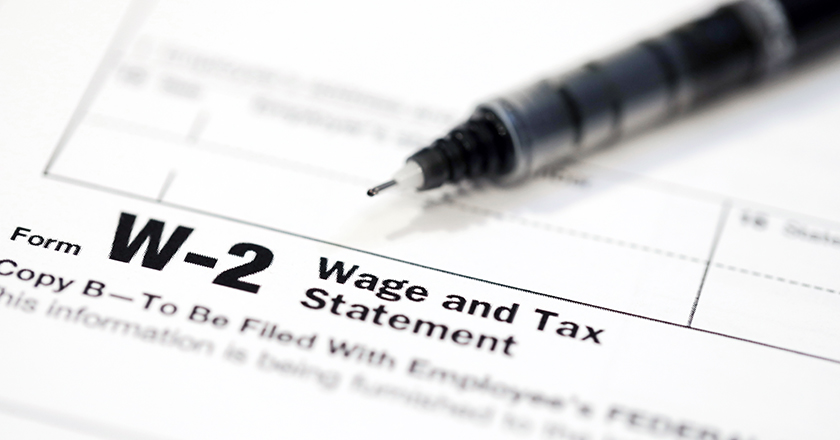It’s that time of the year. As 2020 comes knocking, businesses are busy preparing tax reporting forms for their employees and independent contractors.
Generally, employers must file Form W-2 for full-time employee showing the total wages paid and taxes withheld for the year, and Form 1099 MISC for independent contractors and other non-employees. And unless you file your W-2s and 1099s online, you must also file Form W-3 or Form 1096 as a summary of the W-2 and 1099 reporting. Employers must also file Form W-2 for each employee with the Social Security Administration.
If you have any questions about filing W-2 and 1099-MISC forms, contact Resourcing Edge. As a Professional Employer Organization (PEO), we can handle all of your employer-related compliance needs, including payroll taxes, tax forms, W-2 and 1099 filings, and more.
W-2 and 1099 Tax Reporting Deadlines for 2019 Taxes
Ever since the PATH (Protecting Americans from Tax Hikes) Act was signed into law by President Obama in 2015, the deadline for filing Forms W-2, W-3, 1099, and 1096 is January 31. The deadline for filing Form W-2 for each employee with the Social Security Administration is the same.
January 31 is also the deadline for submitting reports to employees. Still, you will want to send forms to your employees before the end of January so there’s time to fix any errors if there are any.
The January 31 deadline also applies to Form 940 (The Federal Unemployment Tax Report) and Form 941 (Employer’s Quarterly Federal Tax Form).
This accelerated timeline has put added pressure on businesses to file earlier than ever before.
Here’s a list of federal tax filings and dates for tax year 2019:
DUE JANUARY 31, 2020
- Form W-2, Wage and Tax Statement
- Form 1099-MISC, Miscellaneous Income
- Form W-3, Transmittal of Wage and Tax Statements
- Form 941, Employer’s Quarterly Federal Tax Return
- Form 940, Employer’s Annual Federal Unemployment (FUTA) Tax Return
- Form 1096, Annual Summary and Transmittal of U.S. Information Returns
DUE MARCH 2, 2020
Form 1095-B, Health Coverage, and Form 1095-C, Employer-Provided Health Insurance Offer and Coverage delivered to employees (extended from January 31)
DUE FEBRUARY 28, 2020 (Paper Filing) or
DUE MARCH 31, 2020 (Electronic Filing)
- Form 1095-B, Health Coverage
- Form 1095-C, Employer-Provided Health Insurance Offer and Coverage
- Form 1094-B, Transmittal of Health Coverage Information Returns
- Form 1094-C, Transmittal of Employer-Provided Health Insurance Offer and Coverage Information Returns
For updated tax information, refer to the Internal Revenue Service.
Early Filing Deadlines for Some States
Most states have adopted the January 31 federal deadline with additional states expected to follow.
Check with your state’s tax division to see if they have an earlier deadline for payroll filings. For instance, California requires all employers to electronically submit employment tax returns, wage reports, and payroll tax deposits by January 1, 2019.
When You Have to File Online
Some corporations are required to file tax returns electronically. According to the IRS, “Those corporations with $10 million or more in total assets and that file 250 or more returns a year are required to electronically file their Form 1120, 1120S, and 1120-F.”
Don’t File Late!
Even if you can’t pay your taxes, it’s important to file on time anyway. If you file late, you’ll be subject to costly penalties and interest charges.
By working with a PEO with an automated payroll processing system, you’ll never have to worry about filing late.
W-2 vs. 1099
The difference between a W-2 worker and a 1099 worker is the difference between an “employee” and an “independent contractor.” If you’re an employee, you receive a W-2. If you’re an independent contractor, you get a 1099.
W-2 Employees
- The employer directs and controls the work and how it is done, through training, work schedules, and other means.
- Federal income tax, social security tax, and Medicare tax are all automatically deducted from your paycheck by the employer and paid to the government.
- Supplies and equipment are provided by the employer to perform the task.
1099 Contractor
- The work schedule, method, and process are determined by the worker. The contractor is a separate business entity and can provide services to other clients.
- The independent contractor is responsible for calculating the payroll taxes and filing quarterly tax payments with the IRS.
- The independent contractor supplies their own tools and supplies and accepts tasks on a case-by-case basis.
- Any independent contractor that is paid over $600 in a calendar year receives a 1099.
The IRS applies the usual common law rules to determine if a worker is an independent contractor or an employee. It’s important that you classify your workers correctly since the IRS sometimes imposes fines and penalties for misclassifications.
If you don’t know if a member of your team is a W-2 or 1099 worker, you can file Form SS-8 with the IRS or speak with one of the HR specialists at Resourcing Edge.
Once you have figured out whether the person working for your company is an employee or independent contractor, you’ll know which form to file.
Streamline Your Year-End Tax Process
Resourcing Edge makes it easy to prepare and file your taxes so you don’t have to worry about late payments, misclassification of workers, or other compliance-related issues. Use our year-end tax checklist to keep track of year-end tax tasks.
We save you time and money by tracking exactly how much employees and contractors are paid each calendar year. Employers and employees have 24/7 access their documents by logging into their Resourcing Edge dashboard.
We know that the end of the year can be a stressful time. We’re here to make things as easy as possible. Contact Resourcing Edge today for your free consultation!
- re360 Rehire Fact Sheet - August 19, 2021
- Job Analysis_Physical Demands Checklist - August 19, 2021
- Job Description Questionnaire - August 19, 2021

